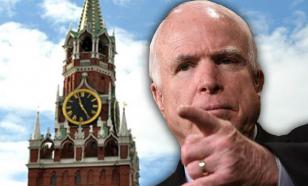Thousands of protesters reach fence surrounding G-8 summit
As police is concerned about keeping protesters from reaching the seaside resort where the meeting starts Wednesday, leader of Germany and the U.S. appeared optimistic about bridging the divide on climate change at this year's Group of Eight summit.
German Chancellor Angela Merkel, who has made climate change the centerpiece of her G-8 leadership, was meeting with U.S. President George W. Bush over lunch to try hashing out some of their differences before the summit begins later Wednesday.
The U.S. has now acknowledged that global warming is a serious problem that must be addressed, and that doing so requires a global goal. Europe and others have come around to Washington's view that no solution is viable without the participation of developing energy guzzlers such as China, India and Brazil, and that economic growth can't be sacrificed for progress on climate.
"There's a lot more in common, in a way, than there is disagreement," said Bush's national security adviser, Stephen Hadley.
As the leaders of the world's most industrialized nations were making their way to picturesque, coastal Heiligendamm, thousands of protesters swarmed near the fence surrounding the summit site, and several hundred reached the razor wire-topped fence, police said. Some were throwing stones at police and officers used water cannons in response.
Protesters also managed to block two routes leading from the airport in Rostock, police spokesman Manfred Luetjann said. "We wanted to prevent this from happening but now they are there and we are handling it," he said.
In the nearby town of Bad Doberan, police sent more than 100 protesters in rainbow-colored wigs - calling themselves the Rebel Clown Army - scurrying off the street and into pastures flanking the country road.
"We're just sunny, happy people who want to rescue the world from hunger, pollution, hierarchy, and capitalism," said one protester.
Police fanned out across the region in northern Germany to prevent a repeat of the violent demonstrations last weekend - Germany's worst in decades - dubbed the "Rostock Rumble."
Meanwhile, summit host Merkel - determined to find agreement on climate change - was meeting individually with leaders before the summit opens with a reception at a local castle.
She is pushing specific targets for reduction of the carbon emissions believed to cause global warming, including a "two-degree" target under which global temperatures would be allowed to increase by no more than 2 degrees Celsius (3.6 degrees Fahrenheit) before being brought back down. Practically, experts have said that means a global reduction in emissions of 50 percent below 1990 levels by 2050. Merkel supports a global carbon-trading market as one tool.
A report in May from a U.N. network of more than 2,000 scientists estimated that the world must stabilize the amount of greenhouse gases in the atmosphere within eight years to keep global temperatures from spiking to disastrous levels.
But Bush remains opposed to hard targets, preferring that voluntary goals be met primarily by technological advances. Last week, he announced his idea for how to move forward: a global emissions goal negotiated by the world's 15 largest polluters, including the big emerging economies, by the end of next year.
The catch: Each nation would decide for itself how to meet the goal and whether to make the targets binding.
Charles Kupchan, director of Europe studies for the Washington-based Council on Foreign Relations, called Bush's pre-summit climate announcement "more of a palliative to the Europeans rather than a serious step forward."
"It's very difficult for me to believe that Bush, when he comes to the end of his administration, is going to sign off on some deal that he wasn't willing to sign off on before," he said.
British Prime Minister Tony Blair said he believed leaders would reach agreement on cutting greenhouse gases. In an interview with the Guardian newspaper, Blair said the United States was "on the move" over global warming.
"The key elements of this are an acceptance that the climate is changing in a dangerous way as a result of human activity. Secondly, we need a global agreement that includes all the main players, including China and America, and at the heart of that there has to be a global target for a substantial cut in emissions," Blair was quoted as saying. "I believe it is possible to get all that way."
Leaders also were expected to confront Russian President Vladimir Putin about his country's increasingly frosty relations with the United States and Europe. The days leading up to the summit were dominated by jarring rhetoric from Putin over U.S. plans to base a new missile defense system in nearby Czech Republic and Poland.
Blair said he expects to have a frank conversation with Putin. The missile defense plan "has always been about the danger of rogue states" - not Russia, he told the British Broadcasting Corp. in an interview aired Wednesday.
"The truth of the matter is that, for all sorts of reasons, it is not something that is really about Russia at all and yet suddenly it is put up by Russia in this way, in quite a confrontational way," he said.
"Now I think the sensible thing, and this is what I'll do certainly when I meet President Putin, is just to have a frank conversation about the state of the relationship between not simply Britain but Europe and Russia," he said before departing for Heiligendamm for his farewell G-8 summit.
Merkel has fretted about the dispute's effect on U.S.-Russia relations and beyond but has had her own frosty meeting with him, criticizing his crackdown on political opponents. They are to meet again Wednesday.
This sort of firm line earned praise from Bush. "She's proven herself to be a very strong leader," he told reporters.
Subscribe to Pravda.Ru Telegram channel, Facebook, RSS!




